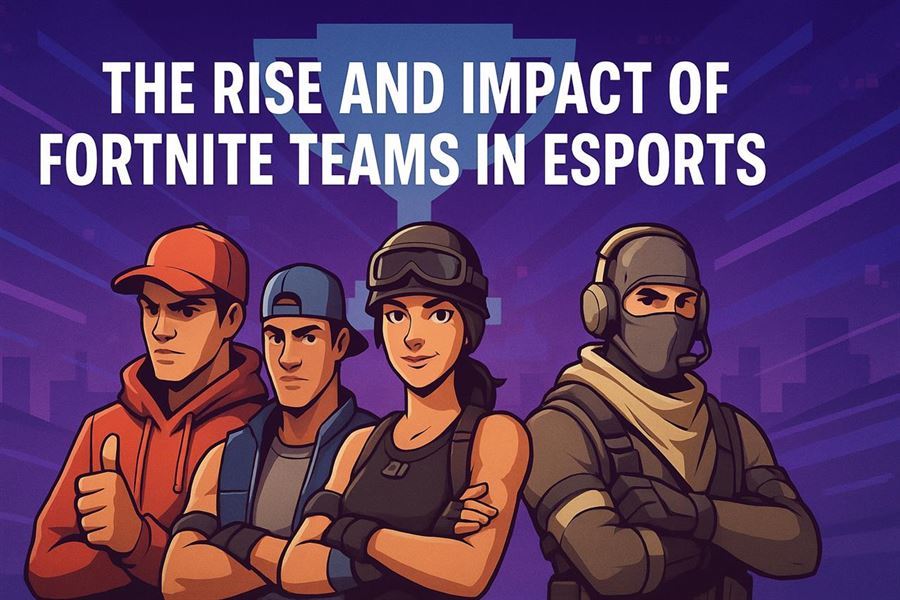The rise and impact of fortnite teams in esports

Since its release in 2017, Fortnite has transformed from a popular battle royale title into a massive cultural and competitive phenomenon. A crucial component of this shift has been the emergence and evolution of Fortnite teams, which play a vital role in shaping the esports scene surrounding the game. From casual squads to professional organizations, Fortnite teams bring together talent, strategy, and entertainment under one roof.
What Are Fortnite Teams?
Fortnite teams are groups of players who compete together in various game modes, including Duos, Trios, and Squads. In competitive formats, these teams often represent esports organizations and participate in tournaments, scrims, and events with significant prize pools. While Fortnite is often recognized for its solo gameplay, team modes introduce a new dimension of coordination, planning, and synergy.
Team Composition
Competitive Fortnite teams are typically composed of highly skilled players who specialize in different roles. Although the game doesn't have fixed roles like in MOBAs or traditional team shooters, players often take on informal roles based on their strengths:
- In-Game Leader (IGL): Makes strategic calls during matches.
- Fragger: Focuses on engaging and eliminating opponents.
- Support: Assists with building and provides backup during fights.
Team dynamics rely heavily on communication and trust, making practice and team chemistry essential to success.
Professional Fortnite Organizations
Over the years, numerous esports organizations have established Fortnite rosters featuring some of the biggest names in the game. These organizations offer players salaries, sponsorship deals, and access to resources for improving their performance.
Notable Esports Teams in Fortnite
- FaZe Clan: One of the most recognizable names in esports, FaZe Clan has consistently recruited top Fortnite talent.
- Team Liquid: Known for excellence across multiple titles, Team Liquid has maintained a strong Fortnite presence.
- NRG Esports: With a focus on content and competitive success, NRG has built a diverse team of Fortnite players.
- 100 Thieves: Combining competitive play with lifestyle branding, 100 Thieves has attracted both elite players and massive fan followings.
These organizations contribute to Fortnite's ongoing relevance in esports by nurturing talent and engaging with the game's global community.
How Fortnite Teams Train and Compete
Training regimens for professional Fortnite teams are more structured and disciplined than many might expect. Unlike casual play, where players drop into matches spontaneously, professional teams follow preparation routines that simulate tournament conditions.
Scrims and Creative Practice
Competitive teams often participate in structured practice matches, known as scrims, to hone their strategies against other top teams. Additionally, they use Fortnite’s creative mode to practice building, aiming, and specific in-game scenarios.
Major Tournaments and Events
Fortnite hosts numerous competitions throughout the year, including the Fortnite Champion Series (FNCS), Invitational Events, and Content Creator Showdowns. These events often feature a team-based format, offering players a chance to cement their legacy while competing for millions in prize money.
The Cultural Influence of Fortnite Teams
Beyond competitive play, Fortnite teams have a significant cultural presence. Players often stream their gameplay, participate in social media trends, and collaborate with creators from various entertainment sectors. This blend of esports and pop culture is part of what makes Fortnite teams unique compared to traditional esports formats.
The Future of Fortnite Teams
As Fortnite continues to evolve, the role of teams in both competitive and casual modes is expected to grow. With Epic Games supporting esports initiatives and the Fortnite community embracing team-based content, the foundation is set for even bigger opportunities.
Whether you’re an aspiring pro, an avid viewer, or a content creator, Fortnite teams offer a gateway into a dynamic and rapidly expanding world where collaboration, competition, and creativity reign supreme.